Travel Agents, Guides, & Destinations, etc
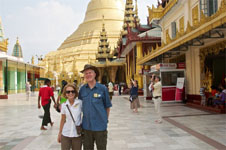
We love our travel agent Dianne Blackburn at Gateway Travel in Spartanburg, South Carolina. She usually follows our progress when we fly and has even called ahead and rebooked flights when she knows we won't make connections. We call her from all over the world. We have used her for over 20 years and feel she consistently gets us the best deals. Susan takes whatever deals she can find to her and Dianne tries to get a better deal. Even when we book a cruise etc we make sure Dianne gets credit with the Cruise Line.
Destinations
When most travelers think about Bangladesh they instantly think about going to Chittagong and Cox Bazar. Cox Bazar is the longest beach in the world but you have to go through Dhaka to get there by plane. We covered the entire western half of Bangladesh and left the eastern part where Cox bazaar is for a later trip. We covered most of the archaeological ruins that are important and the monuments as well. The city of Dhaka has a lot of interesting places and great places to eat. Sundarban (also spelled Sundarbans) was certainly the height of our trip. The hill country in the eastern part of the country is not currently considered safe for tourists.
Green Bangla Tours
We couldn't have been happier with Salman and his dad who run Green Bangla Tours. The local language for the whole country is Bangla and we really DID need the guide. The guide would leave us in a corner in a train station or somewhere and go arrange for taxi (ie... Tuk Tuk or rickshaw). with locals without them seeing us and trying to jack up the price for tourists. We certainly felt safe and that is saying a lot as there was a lot of violence going on as one of the political parties was enforcing a bus, truck, and car strike. The first part of our trip we had Salman's regular driver in his Toyota but the strike tightened and we had to take the train from Bogra to Kulta and tuk tuk from Kulta to Mongala. We didn't mind but we had to take an all day & all night paddle wheel boat back to Dhaka after Sunderbans. He spoke excellent English and was very street savy. We paid for the whole trip in advance and at times gave 100 taka tips and we gave much larger ones to the crew of the boat in Sunderbans and even more for the armed forest ranger who was always with us. Also for our driver the first half of the trip. We spent not a penny except for the tips.
Travel Insurance
What we want most is the actual help given by the Insurance issuer for a medical or emergency evacuation. We don't insure our trips for cancellation any more. I think frequent travelers should be members of Divers Alert Network at a level that covers evacuation, not just the cost but the arrangements.
Travel Agents
Our travel agent Dianne Blackburn at Gateway Travel in Spartanburg, SC is one of the most important people in our lives. She always gets us the best deals and finds us the best trips. She has helped us when stranded outside of the US and has changed arrangements on the fly multiple times. She knows when we check in to our airlines and hotels and often has called ahead and changed arrangements while we are traveling and unable to make connections etc. The cruise lines we travel work with her. She is a widely-travelled person and we have learned much of our travel knowledge from her.
Alcohol
There is one manufacturer and distributer of alcohol in this Islamic country and it is in Dacha. You must bring your own or arrange in advance for Green Bangla Tours to provide alcohol if you require it. Even they can't find this for you outside of Dhaka (I don't know about at Cox Bazar though). You wouldn't be welcome to consume alcohol in public.
Wildlife
You will see better wildlife on the Serengetti, Yellowstone, or Kruger National Park but not many other places. While the best location to actually see the Royal Bengal tiger in the wild, most visitors don't see them. The birds, however, were spectacular and amazingly approachable.
Language
We have been to India five times and expected that English would be as common in Bangladesh as in India but I was wrong. It is no longer taught in school as during the time this country was part of India. The country has the advantage of having Bangla as a national language with a homogeneous population so everyone can speak to one another so one bilingual guide can lead you around the entire country.
People
We thought people in Tahiti, Goa, and Thailand were the most pleasant in the world but the Bangladeshis were probably even better. We had concerns about feeling out of place in a nation 95% Islamic and have never really been able to interact and photograph Islamic women but had no problems with almost universal interaction. Tourists are VERY rare and my white hair really set me apart from the norm and we had welcoming new crowds of friends at every turn. I am convinced that no other society can as amicably negotiate the traffic mess both on the streets and sidewalks without animosity or injury. I felt safe but realize that we always were in the presence of a very street savy guide and often our driver as well.
Food
There were a few western foods on menus such as chicken noodle soup and french fries but most of the food is Bangladesh food. In Dhaka we saw pizza, Mexican, Thai, and Chinese restraunts. We had told our guide that we wanted to eat Bangladesh food and that is what we did. Every meal including breakfast included dal and one or both of white rice and some local flat bread. As much as we love street food on our travels, Bangladesh is NOT the place to eat ANY due to the severe sanitation issues. Don't eat any raw vegetables or fruits that you didn't wash in bottled water and peel yourself. Don't even think about salads.
Visas
Get your visa through Washington Passport and Visa Services, wpvs.com. They have come through for us many times over the years. Be sure you have your visa in hand a good month before you go.
Passports
Our US passports were required at all hotel checkins. We only usually carry a quality photocopy with us on our persons like we do in most countries. Please note, in many countries now our driver's licenses are checked when we use our credit cards also!
Travel Insurance
What we want most is the actual help given by the Insurance issuer for a medical or emergency evacuation. We don't insure our trips for cancellation any more. I think frequent travelers should be members of Divers Alert Network at a level that covers evacuation, not just the cost but the arrangements.
Weather
It is always colder or hotter in the countries than we expect when we research what to take before we leave the US. Also, most of the world has larger spreads between daily highs and lows than we do in the eastern United States. We anticipated hot weather and awoke to high 40's Fahrenheit ( 8 degrees Celsius) several mornings in a row!!
Hotels
We saw one Best Western and one Raddison in downtown Dhaka that looked nicer than the hotel where we stayed. The one where we stayed in Dhaka was nicer than all of the other ones we stayed in. The Sunderbans boat was similar in amenities and outfitting to the live-aboard SCUBA diving boats we stay on throughout the world and the food was excellent. We believe we stayed at the best hotels in most out-of-Dhaka towns but even for seasoned world travelers we had some adjustments to make in our expectations.
Don't Forget To Take...
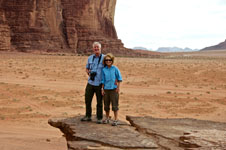
Take a small flashlight or head light for emergencies and for looking under the bed. I take at least a dozen plastic clothes pins and a good string for a clothes line. Take good sun screen and insect repellant and pack them in plastic boxes or Nalgene bottles. Take extra glasses and sun glasses. A copy of your vision prescription has been a Godsend to travelers on several of our trips and could come in handy in some ports such as Hong Kong where glasses are inexpensive. In much of the developing world you bring your own toilet paper with you to public toilets so we carry a lot of small packs of tissues. Susan carries her own dual voltage curling iron. You might swap photos with other travelers by using an SD card or usb stick so carry a few cheap ones. One of the most important thing not to forget is to take some photo copies of your passport picture page. Because you use the photocopy of your passport rather than the actual passport you may still need your driver's license or other government issued ID at some money exchanges etc or if you have marked your credit cards CID.
Medical Considerations
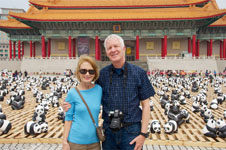
Be sure and take some bandaids. Carry medication for a common cold, for gastroenteritis, for cuts & scrapes. Carry several types of antibiotics. I like to have some Augmentin, Cipro, cephazolin, and some doxycycline. Take some handkerchiefs When visiting malaria prevalent areas we choose to take mefloquin but some people have bad dreams on it. We have learned to get medical evaluation of infectious diseases in the area the disease it was acquired as so very many local physicians and pharmacists know exactly what is prevalent in that area and it's treatment. I would rather have invasive or surgical care back in first world countries. Know what your health insurance will cover over seas. I always take some cough drops, ear drops, eye drops. Check with the Center for Disease Contorl website about all countries you will be visiting.
We were travelling in a country with severe known health concerns such as air pollution, almost universally unsafe water supply, an influenza epidemic, and malaria. Hand sanitizer and bottled beverages are the most important things. Only bottled water with intact seals are good enough as water bottles are frequently refilled world wide. You will quickly see from the bathrooms that hand sanitizer is much better than trying to wash hands and dry them on dirty community towels. We love the local experience and hate that our world is being polluted by empty water bottles but we do get sick in out of the way places that we sent a lot of money to visit that we are very careful. That said, it is often good advice to get medical TESTING an ADVICE locally for infectious diseases as physicians in the US are not familiar with many exotic tropical diseases. WHAT TREATMENT TO TAKE may be a different story. As a retired physician I would rather take an antibiotic that I brought or bought myself from a local pharmacist after double checking the advice on the internet than delaying therapy till I got home. Surgical therapy would be much more scary in underprivileged parts of the world. I no longer keep my medical license so I have my Internist each year refill my cipro, doxycycline, metronidazole, eye drops ear drops, Tamiflu, malaria prophylaxis medication, and one extra 90 supply of my home meds (since I can't refill them when out of the country). We carry lots of pink bismuth (Peptobismal), immodium, Neosporin Ointment, cold meds, motrin, tylenol, nasal spray, and glycerine suppositories. For malaria prophylaxis on this trip we took our old standby weekly mefloquin as no mefloquin resistant malaria was noted on the CDC webpage for this travel destination (we do plan to add doxycycline for the area between Yangon & Mandalay as soon as we leave Bangladesh).
Hygiene
Always carry toilet paper as this is not widely used outside of cities. Always carry and use hand sanitizer. Never drink anything that doesn't come from a sealed bottle. Use insect spray more than once a day and keep feet well sprayed. Don't swim in any water except at the beach. We carry small travel towels from REI and every trip or two these are indispensible.
Photography
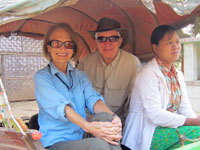
This was definitely THE place to have a big digital SLR camera around your neck. EVERYONE posed automatically and WANTED their pictures taken. What surprised us most was this included Islamic women in traditional garb. In much of the world these women make no eye contact with men, don't want photos taken, and have someone around to enforce the rules. Not so here. There was so much color and differences in dress and style. A different world!! People would come up to us and take us to something they thought we should photograph. Many people wanted a picture taken with us. We use Nikon cameras and I recently upgraded from a D90 to a D7100 and couldn't be happier as it focuses so much faster, works higher shutter speeds, autofocuses videos, and does High Dynamic Range photos. It is heavier than the D90 and Susan won't upgrade until something as good comes along that is lighter. I use a Sigma 18-250mm lens but if I bought now I would get their 18-300mm version. Susan uses a lighter weight Nikon 18-200mmVRII lens. I carry a Sigma 10-20mm lens for architectural shots and shots I just can't get back far enough. I prepare projects in Apple Aperture for each expected photo shoot before leaving on my trips and I just import my photos from SD cards into the preprepared Aperture project allowing Aperture to back up my Nikon RAW files to a USB drive as they are imported and erasing them from my camera SD card all at one time. I usually copy my Apple Aperture library during the trip to another SD card that I carry in my wallet in case I have computer failure. We each carry a small waterproof point and shoot camera to use for dusty or rainy or other occasions. Before we leave home I sync the time on all of my cameras and lock my iPhone's time to stay at my home time zone. That way, I just tell Aperture that the cameras will all be registering Eastern Time but to adjust it to local time at import. Having my cameras get out of sync with time has caused much trouble picking the best shots when multiple cameras are photographing the same subject at the same time. We carry plastic bags large enough for our SLRs to fit. These are helpful for rain but are most useful for sealing the cameras in the bag inside a cool hotel room and waiting till the cameras heat up outside before opening the bag. This has saved much moisture condensation inside our cameras and delays in the day's photo shoots.
Computer & Phone
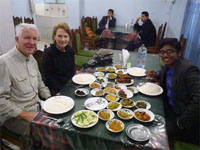
Cell phone service was everywhere, even the Sunderbans. Probably better coverage than we have in rural US but the guides complained of slow data service. We have Verizon in the USA and we get our text messages through Wi-Fi. We leave our data turned off on our iPhones and our families communicate with us by text messaging which works well as we are 13 hrs different in time zones. We found in the past that in emergencies a phone is a great thing to have despite the high expense. The flashlight on the phone is invaluable. We check with Verizon to see how much phone calls are a minute in countries we visit but we really just don't do much (or any) voice calls on our long frequent travels.
We carried a MacBook Air and downloaded our photos to Apple Aperture each night and tried to cull down and edit our pictures as soon as we could, especially while traveling. It's hard to remember the details of a photo if you wait too long. Using the long flights we took, we had all photos edited and jpeg's made for Susan's Story by the time we landed.
We had Wi-Fi in half of our hotels, usually only in the lobby and often the desk clerk had to turn it on. It certainly wasn't as fast as in the US or Europe. In Dhaka we had a great connection. As noted below we don't connect by cell carrier outside the US so I am not a good source of information about that. We have been on multiple tours where other people have ended up with multiple thousand dollar cellular bills later so do your homework. At some point we will probably stay in one country long enough to by a SIM card locally for one of our unlocked iPhones.
Electrical
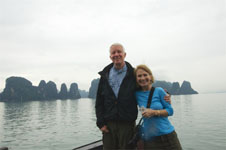
220 volts. The European connector fits but falls out a little easily. Their plugs are slightly thicker and slightly farther apart than the European ones. We only take dual voltage appliances and run standard American cube splitters after the initial adapter. We did see some Australian and British receptacles in places. We use our iPhones for alarm clocks.
Clothing

You don't need fancy clothes here. We wore our synthetic quick dry travel shirts and zip off pants all the time except one day we put on shorts in Sundarbans. In Islamic countries women need to keep shoulders covered and legs covered. You will get dirty and muddy. We wash out clothes in sinks, wring them in towels and air dry them constantly. This allows us to pack lightly. We take almost nothing cotton if we don't need to dress up. We have continually tuned our travel wardrobes to be FEW, QUICK DRYING, WRINKLE RESISTANT, MIX AND MATCHABLE, and with ZIPPABLE POCKETS. We were surprised that we often wore our silkweight Capilene pants and long sleeve tops, polar fleeces, and even down jackets. These store small and are light and having these along saved the day as it often does on trips. You can't make a 2 hour tuk tuk ride without thermal protection. The locals wore even warmer clothes. I always carry at least one pair of Magellan quick dry black socks. What I really appreciate are a couple pair of Smart Wool short socks and can get these to dry out quickly if I towel them well. A couple pair of ExOfficio under pants and a short sleeve silkwieght Capilene colored tee shirt or two always are in my travel bags.
Packing
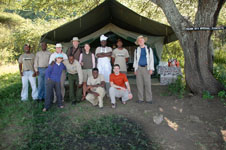
We carry less and less the more we travel. We left our one combined suitcase at the hotel in Dhaka. This held our shorts for Thailand, our nice clothes for our Viking River Cruises Myanmar Irrawaddy cruise and our Japan winter clothes for the visits that would follow after we left Bangladesh. We each had a very small roll aboard suitcase and a small backpack. I can't say enough good things about our International Traveller roll aboards. Clearly a generation better than what we had even a year ago! Things will get dusty if you have to travel a long way in tuk tuks.
Money
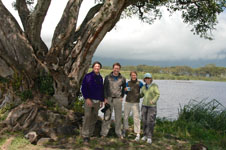
(At this time 77.5 Taka/dollar) In Dhaka only can you get by with paying tips with US dollars or Euros or Australian dollars. NOBODY takes credit cards but we found good ATM's in Dhaka. We had exchanged dollars for local currency at the airport and the standard tip at meals or porters is 100 taka which is less than a euro. At the silk factory Susan paid for her purchases with her credit card but that surprised our guide. We had made a bet on which of us would see a MasterCard or Visa emblem on a business and the silk factory was the only place outside of Dhaka on our entire trip, even hotels!!! We tipped Salmon in US dollars and encouraged him to hold them and watch exchange rates. This is definitely a cash only society.
Transportation
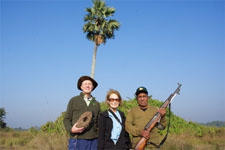
The Sundarbans boat was similar in amenities and outfitting to the live-aboard SCUBA diving boats we stay on throughout the world and the food was excellent. The paddle wheel steamer that took all day and night to get from Morretgone to Dhaka was a real hoot with most of the people sitting and sleeping on the floor and people cooking communally. Susan & I had a “first class†room that probably started as luxury in Calcutta when it was built in 1928 but had gone downhill a long way. However it was an experience dictated by the violent strike and turned out to be an experience we wouldn't have missed for the world. The beds were consistently hard but clean & warm, the room was secure, and the best place to spend about 19 hours in a country with air pollution and river pollution during flu season. Salman bought the tickets, ushered us on, gave us packaged food and soft drinks, and checked on us constantly. Our tour company of course had planned a private air conditioned car for the entire trip except for the Sundarbans portion but the strike prohibited it. Green Bangala tours actually strongly discouraged tourists from coming to Bangladesh during the strike for safety reasons.
Otherwise:
Trains, planes, automobiles, tuk tuks, boats, and rickshaws will be used on your trips. We didn't use buses as there was a strike so I can't comment on them. I feel comfortable to say that even as experienced travelers as we are it would be impossible for us to have driven without running over literally dozens of tuk tuks, rickshaws, & pedestrians.

